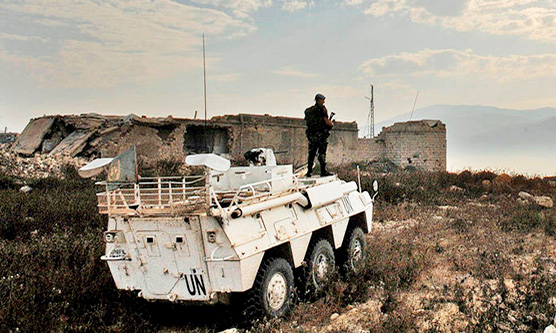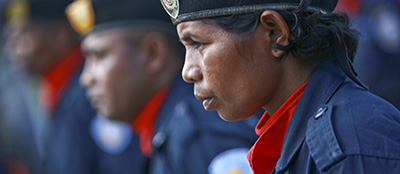This rapid literature review, in annotated bibliography format, collates a large amount of literature published in 2013 and 2014 (up to April 2014) on the topic of gender in fragile and conflict-affected situations. It is not a systematic or exhaustive review, but does provide a comprehensive overview of the literature available. It includes all types of available written ...» more
Conflict
Conflict analysis of Liberia
It is over ten years since Liberia’s final peace agreement was signed in 2003, putting an end to 14 years of violent civil wars. This paper finds that current levels of overt conflict in Liberia are relatively low, and there has been no large-scale violence since the end of the second war. However, it also finds that many of the root causes and grievances that led to the wars ...» more
Sending messages to reduce violent conflict
Key findings Research for this helpdesk report did not find a specific body of literature focused on sending messages to change attitudes, norms and behaviour about violent conflict. Rather, there is a wide range of literature that covers interventions to address conflict, which include the sending of messages in one form or another, and often as part of a wider strategy. This ...» more
Conflict analysis of Algeria
Local and regional protests about a diverse range of socio-economic issues have been taking place in Algeria since 2011. However, much of the literature suggests that Algeria was not greatly affected by the protests emerging from the 'Arab Spring'. The Algerian government has succeeded in preventing protests from escalating to the levels witnessed in neighbouring countries ...» more
Conflict analysis of Mauritania
Mauritania is a large, mostly desert territory, populated by 3.2 million inhabitants and with a history of military rule and regime change through coup d’états. It has a history of inter-ethnic conflict and politicisation of identity with a notable border dispute in 1989 between Mauritania and Senegal resulting in violence and the deportation of non-Arabic speaking (i.e. black) ...» more
Conflict analysis of Morocco
Since the onset of the Arab Spring, Morocco has experienced protests about a diverse range of economic, political, and social issues. King Mohammed VI responded rapidly to the early protests, implementing a new constitution in 2011. However much of the literature suggests that, to date, these reforms have had a limited impact. Moreover, there have been rising levels of unrest ...» more
Conflict analysis of Tunisia
The revolution in Tunisia in 2011 – the first political upheaval of what became the ‘Arab Spring’ – marked the end of over five decades of authoritarian rule, first by post-colonial leader Habib Bourguiba and then by Zine al-Abidine Ben Ali. The country’s first democratic elections, held in March 2011, produced a coalition government comprising of the dominant Tunisian Islamic ...» more
Preventive diplomacy and conflict prevention
This report provides an overview of the literature on preventive diplomacy and conflict prevention, with particular emphasis on regional approaches to preventive diplomacy. The last few years have seen a renewed interest in both preventive diplomacy and conflict prevention. Regional initiatives are playing an increasingly important role in preventive diplomacy and conflict ...» more
The shadow economy in conflict-affected countries
Approaches which can be used to leverage the positive social function that shadow economies provide to conflict-affected populations include: Using humanitarian aid to complement people’s coping strategies (Goodhand, 2006). Understanding the relationship between different aspects of the economy through stakeholder assessments can reduce the risk that interventions have ...» more
Peacebuilding and economic growth
This report provides an overview of the literature on the relationship between peacebuilding and economic recovery and growth in fragile and conflict affected states, with particular emphasis on the Asia-Pacific context. The majority of the conflicts occurring in the Asia-Pacific region take place at the sub-national level. There is evidence to suggest that while many of the ...» more
State fragility and social cohesion
This report reviews the relationship between social cohesion and state fragility – focusing on literature from 2010 onwards. There is no clear empirical understanding in the literature of how social cohesion contributes to state resilience or fragility, as it is very difficult to measure, and to assess independently other variables that impact on state fragility. Key points ...» more
Lessons from implementing peace agreements: what next for Colombia?
Conflict in Colombia has deep roots, with over 50 years of armed conflict between state and non-state armed forces, more than 220,000 people estimated dead, and five million internally displaced people (ICG, 2013). Since the 1980s, there have been many formal and informal peace negotiations between the state and the different non-state armed groups. But no agreement to date has ...» more
Citizens’ role in political settlements
Political settlement literature focuses predominantly on elites, with citizens often seen as passive beneficiaries or potential spoilers. However, emerging literature on the role of civil society in peace processes identifies roles that citizens have played and can play, in creating and maintaining what are essentially political settlements. This report outlines the concept of ...» more
Post-2015 governance and peace indicators
The post-2015 High Level Panel (HLP) produced a report in May 2013 which outlined their recommendations for moving the development agenda beyond the Millennium Development Goals. The report contained 11 illustrative goals which the UN might consider for adoption. This report considers potential indicators for the new Goals 10 and 11, which are: 10. Ensure Good Governance and ...» more
Islamic radicalisation in North and West Africa: drivers and approaches to tackle radicalisation
This paper synthesises literature on Islamic radicalisation in North and West Africa, with a particular focus on the drivers of radicalisation and evidence on approaches that have attempted to tackle radicalisation. There is significant debate in the academic literature concerning the definition of ‘radicalisation’. For the purposes of this report, the definition of Islamic ...» more
Transitional justice lessons for Syria
Literature on transitional justice (TJ) experiences in the Arab world is limited, but there is some emerging analysis. This report found the literature highlights factors common in the region that have implications for TJ processes. These include: weak state legitimacy and capacity; decades of authoritarian rule and deep societal divisions; deep-seated socio-economic ...» more
Responding to the Syrian refugee crisis in Lebanon – lessons learned
Three groups of lessons emerge from the literature: Political lessons include: understanding Lebanon’s historic refugee experience; understanding how sectarian divisions affect policy and decision-making; the limitations of excluding key stakeholders; and understanding historic relations between refugees and host communities. Strategic lessons include developing a medium-term ...» more
Recent literature on instability and intrastate conflict in Zimbabwe
There is consensus in the recent (2011-13) literature on Zimbabwe that although the country has stabilised considerably since the last elections in 2008, the risk of internal conflict during the period surrounding the 2013 elections is high. The principal factors underpinning the potential for conflict are: The bitter divisions among the main political parties, the apparent ...» more
International aid to Lebanon
Key findings: Solid data from the OECD and OCHA makes mapping the official aid to Lebanon possible. However, official data is only part of the story: major aid flows have remained unrecorded, for example from Saudi Arabia and Iran. Information on macro-level aid also seems largely gender-blind. Lebanon has received large volumes of international donor aid since the 1970s. ...» more
Stability and stabilisation approaches in multinational interventions
This rapid report is based on quantitative discourse analysis of stability and stabilisation approaches in all current UN, EU and NATO missions. The analysis included a total of 49 missions (covering peacekeeping, civilian and political missions) and 107 mandates/resolutions linked to these missions. Key findings:Out of a total of 49 missions examined for this report, 30 ...» more


